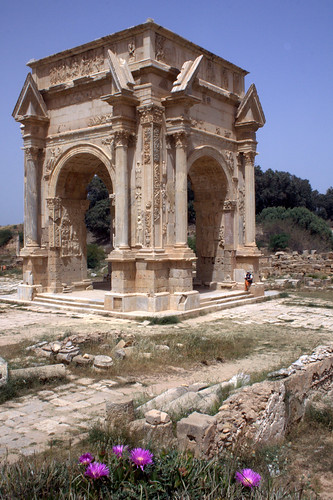I've been thinking a lot about books lately. Especially their future in Libya. I'd always thought mobile libraries were a relatively modern concept, conceived in the west and predominantly (or even exclusively) found there. Imagine my surprise when i saw this photo:
Mobile Library, 1958
As a society we probably read among the lowest numbers of books outside of
impoverished third-world countries. This should not be. But to remedy it,
understanding why we are in this state would be helpful. Is it because, of
course, ignorance is the mother of oppression? Are there so few libraries in
our lands simply because our tyrants discouraged and banned them to block
dangerous ideas? But we have been in intellectual and cultural stagnation for
hundreds of years, since we passed the baton to Europe during the renaissance.
It seems to have been a slow process, starting well before the end of the Ottoman
Empire.
My cousins in Libya weren't quite sure what I was getting at the first time
I complained about the availability of books during a holiday there. Who needs
to read that much anyway? Borrowing? You mean the books are free? How do you
know the people would bring them back when they're done?
To me maktaba means library, not bookstore. Why can books only be purchased?Come on, surely the idea of borrowing books isn't that incompatible with our
culture? Again, look back at the picture above, from about 50 years ago.
"A man who does not read good
books has no advantage over an illiterate man" -Mark Twain
In that respect, our relatively well-off society in Libya has little
advantage over, say, Yemen. The spread of ideas is essential to prevent us from
sinking into the pit of mediocrity like before, and as informative as Aljazeera
news may be, it's not going to cut it. The Arab spring will not produce meaningful
change unless it is a lasting change within our attitudes.
I don't have all of the answers, I don't even have all of the questions, but
we need to start sorting this out now. We have to promote reading across the
world, and especially in the newly liberated countries. We need to lobby our
new government once it is created. Our rebuilding and development must include
public libraries in every town and city, and the great period of upheaval and
change coupled with a new emerging generation gives us the change to embed this
in our culture. I'd expect Egypt-Libya-Tunisia to become the centre of
publishing in the Arab world, as writers will be freest to express their ideas
in our democratic societies.
And if anyone isn't aware of our heritage of science and learning in the Arabic
(and wider Islamic) world, I would recommend these books
here,
here
and
here.
It is time for that heritage to be restored.
Happily, someone is way ahead of me. I saw this on twitter:
Civil Cultural Project: National Library of King Idris I
Someone else on twitter had the idea of starting a book club to encourage
reading. Perhaps starting in Libya, and then expanding across North Africa and
the rest of the Arabic world. We like
goodreads.com:
it's really fun to organise lists and collections of your books, rate them,
show them off to friends and receive recommendations. The social element makes
reading fun and desirable, which is essential. Joining and making your friends
in Libya join would be a very small step, but in the right direction. There is
also so much more that could happen; eventually we could have book conventions,
fairs, all sorts of promotional events. And this would also encourage new
writers. In schools in the UK creative writing forms a very important part of
English lessons, and children are encouraged to use their imagination and make
up stories, as well as improving their literacy.
(I was also pondering another question:, why are
short stories the only (relatively) successful form of Arabic literature? Why
don't we have novelists as good as our poets?)
In my university during the first week of term this year there was a stall
on the walkway outside the Students Union building (which we also need some of)
selling books for £1. I asked about them, and it turns out its being subsidised
by the union to encourage more people to read - the original price on the book
is about £8. It's just a fiction book, nominated for last year's Man-Booker
Prize, but what the book was didn't matter. The objective was just to get
students reading and talking about what they are reading, and this is also
being promoted by talks from the author, discussion sessions around campus over
the next month, and various other events. Philosophy, history, science,
biographies, religious jurisprudence, even fiction. I would even consider
handing out Stephanie Meyer books; we just have to get our children reading!
Does anyone have any other thoughts/suggestions/ideas?
P.S. Does anyone have any further information on either of the 2 photos? perhaps a grandparent who remembers the former? Or details on the plan for the new library or a contact who'd be able to find out? I'd love to know more.
Edit: I just saw this, and it's too funny not to include:






